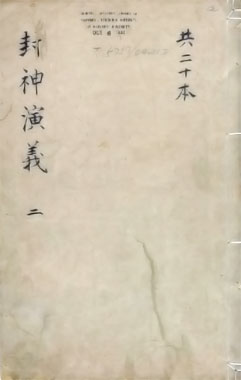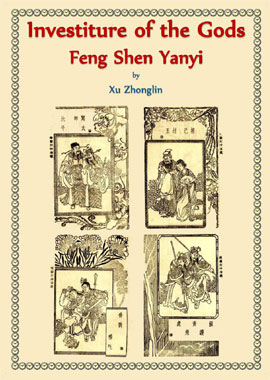

Fengshen Yanyi (1605 ?)
Titre anglais : The Creation Of The Gods.
Titre français : L'investiture des Dieux.
Autres titres : 封神演義, Fēngshén yǎnyì, 封神榜, Fēngshén bǎng
Publié en Chine entre 1567 et 1619, possiblement 1605.
Traduit en anglais en 1992 par Zhi Zhong chez New World Press.
Inédit en français à ma connaissance.
Adapté notamment en le film The Creation Of The Gods I: Kingdom Of Storms 2023.
Attribué à Xu Zhonglin = Chen Zhonglin = Lu Xixing,
Pour adultes et adolescents.
(Fantasy asiatique) Il n’est pas possible de se baser sur les résumés ou adaptations en anglais ou en français disponibles pour résumer le texte original de cette œuvre : les auteurs se sont soit basés sur un commentaire lacunaire, soit ont censuré l’essentiel de l’œuvre pour des raisons politiques ou parce que cette œuvre n’est pas tout public et qu’en Chine le sexe et la violence d’une époque ne peuvent être représentés fidèlement.
***
*
Le texte source chinois ici :
https://ctext.org/fengshen-yanyi/1/zh
*
Traduction approchée en se basant sur les versions variables contradictoires du traducteur en ligne Deepl selon comment les lignes en version chinoise sont découpées. Je ne suis pas en mesure de vérifier si cette traduction est exacte ou complète.
混沌初分盤古先,太極兩儀四象懸。
Du chaos sorti l’Antiquité. (Le Ying et le Yang), les deux symboles du Tai Chi et les quatre éléphants flottaient dans les airs.
子天丑地人寅出,避除獸患有巢賢。
Les habitants de Zitian, Ugli et Yin apparurent, évitant les bêtes et cherchant des abris.
燧人取火免鮮食,伏羲畫卦陰陽前。
L'homme au silex utilisa le feu pour éviter la nourriture crue, et Fuxi dessinait les trigrammes devant le yin et le yang.
神農治世嚐百草,軒轅禮樂婚姻聯。
Shennong règna sur le monde et goûta à toutes sortes d’herbes,
Huan Yuan se maria.
少昊五帝民物阜,
Les cinq empereurs de la dynastie Shaohao rendirent la vie du peuple prospère,
禹王治水洪波蠲。承平享國至四百,
le Roi Yu fit baisser les inondations en aménageant l’eau.
Sa dynastie dura quatre cents ans.
桀王無道乾坤顛,
Le roi Ji ne respectait aucune loi, et le monde en fut tout retourné.
日縱妹喜荒酒色,
Il était un soudard et un obsédé sexuel.
成湯造亳洗腥羶,
Cheng Tan créa Bo pour éliminer la corruption
放桀南巢拯暴虐,
Et exila Ji dans les contrées du Sud pour mettre fin à sa tyrannie.
雲霓如願後蘇全。
Yun Ni, as he had wished, was able to save the country.
三十一世傳殷紂,
C’était la 31ème génération des Tin et Wei
商家脈絡如斷弦:
Les routes commerciales étaient comme des cordes cassées:
紊亂朝綱絕倫紀,
La dynastie était dans la tourmente,
殺妻誅子信讒言,
On tuait femmes et enfants,
穢污宮闈寵妲己,
On croyait des discours creux,
蠆盆炮烙忠貞冤,
Daji, qui n’était qu’une favorite du palais
鹿臺聚斂萬姓苦,
Faisait marquer au fer rouge les gens honnêtes et chastes
愁聲怨氣應障天,
Et sur la terrasse de la biche, les miséreux se massaient par milliers
直諫剖心盡焚炙,
Leurs clameurs et reproches montant jusqu’au Ciel.
孕婦刳剔朝涉殲,
Le palais de Justice n’est plus cendres sur le sol.
崇信姦回棄朝政,
Les femmes enceintes sont jetées à la rue
屏逐師保性何偏,
Les fonctionnaires ont abandonné leur poste
郊社不修宗廟廢,
Les lettrés sont bannis,
奇技淫巧盡心研,
Les champs ne sont plus entretenus ;
昵此罪人乃罔畏,
La religion est abolie
沉酗肆虐如鸇鳶。
Et chacun recherche avec passion des pratiques obscènes.
***

Texte présenté par la Wikipédia comme une traduction anglaise de 2019 de Xu Zhonglin
« Traduction » anglaise de Xu Zhonglin de 2019, en fait le commentaire du texte original que la Wikipédia reproduit traduit en anglais depuis les pages en chinois..
CHAPTER 1
King Zhou and Goddess Nu Wa
At one point in time as King Da Yi, of the newly established Shang Dynasty of China, walked through the royal gardens to gaze at the great beauty that laid before him, the Flying Cloud Pavilion suddenly collapsed. As a single beam from the pavilion fell towards the king, Prince Zi Shou grabbed hold of the beam and threw it aside. After ministers such as Shan Rong and Mei Bo gazed at the strength that the prince possessed, they advised the king to name him Crown Prince. Thus following the death of King Da Yi, Prince Zi Shou took the title of 'King Zhou' and became the new ruler of the Shang Dynasty within its new capital Morning Song.
After seven years of prosperity within the Shang Dynasty, etches of evil tyranny begin to evolve in the heart of King Zhou. As the first rebellion thus took place on the second month of the seventh year, Grand Old Master Wen Zhong, the head of civil affairs, went personally ride out upon his great dragon to subdue them at the North Sea district.
In the following day, the prime minister Shang Rong asked the king to head to the temple of Nu Wa in order to offer their condolences on her birthday. Following the latter's consent, the king and his entourage thus march from the capital's gates to the temple of Nu Wa.
As King Zhou enjoyed the palace's immense scenery after his arrival, he gazed into the eyes of Goddess Nu Wa — who sat behind a celestial curtain. Overtaken by her unparalleled beauty, King Zhou used his ink brush to write a poem of her valor upon a neighboring pillar within the temple. Even after being reproached by Shang Rong for what disaster the poem could bring about, the latter simply brushed him aside saying that it was nothing more than a literary representation of her beauty.
After the king and his entourage had returned to the capital, Nu Wa noticed the poem and immediately vow to end the Shang Dynasty due to the former's vile desires. Once she had arrived at Morning Song atop her phoenix, Nu Wa realized that King Zhou still possessed another twenty years of reign — and would thus live with lustful rage.
As she arrived at her temple, she summoned forth her three right-hand sprites: Daji, the thousand year-old female fox; Splendor, the nine- headed female pheasant; and Jade, the female lute. Thus following their summoning, Goddess Nu Wa told them to transform themselves into beautiful women in order to distract King Zhou from his state affairs — so that he would be overthrown in a further justified manner.
Back in Morning Song King Zhou seated in great depression over the incredible unattainable beauty that Nu Wa had possessed — and thus wished to not perform any action until he could attain her as one of his lovers. After effectively calling minister Fei Zhong to his presence, he suggested to the king that one-hundred women should be taken from each of the four Grand Dukes so that he might have an opportunity to find a woman that ranked in beauty with Nu Wa. With immense delight at such a grand opportunity, King Zhou rested for the night and would make his preparations in the following day.
The beginning of Investiture of the Gods (chapter 1) is titled "King Zhou and Goddess Nu Wa". One day, King Da Yi—first king of the Shang Dynasty of China—was walked through the royal gardens to gaze at the great beauty all around him. Suddenly, the Flying Cloud Pavilion collapsed. As a single beam from the pavilion fell towards the king, Prince Zi Shou grabbed hold of the beam and threw it aside. Some of the royal ministers, including Shan Rong and Mei Bo, witnessed the strength that the prince possessed. They advised the king to name Zi Shou his heir apparent. Thus following the death of King Da Yi, Prince Zi Shou was crowned 'King Zhou' and became the new ruler of the Shang Dynasty within its new capital: Morning Song. After seven years of prosperity within the Shang Dynasty, etchings of evil tyranny began to evolve in the heart of King Zhou.
The first rebellion took place on the second month of the seventh year of King Zhou's reign. Grand Old Master Wen Zhong, the head of civil affairs, personally rode out upon his great dragon to subdue it in the North Sea district. The following day prime minister Shang Rong asked the king to head to the temple of Nu Wa to make an offering celebrating Nu Wa's birthday. King Zhou agreed and he departed with his entourage from the capital's gates for the temple of Nu Wa. As King Zhou enjoyed the temple's immense scenery, he gazed into the eyes of Goddess Nu Wa - who sat behind a celestial curtain. Overtaken by her unparalleled beauty, King Zhou used his ink brush to write a poem of her glory upon a pillar within the temple. Shang Rong reproached the king, saying that a love poem to a goddess could bring disaster, but King Zhou replied that it was an ode to her beauty and thus could not give offense.
After the king and his entourage had returned to the capital, Nu Wa saw the poem as a sexual overture and immediately vowed to destroy the Shang Dynasty for the king's impurity and impudence. Once she had arrived at Morning Song atop her phoenix, Nu Wa realized that King Zhou was destined to rule another twenty years; so, she left in a rage. We she arrived at her temple, she summoned her three right-hand sprites: Daji, a thousand year-old female fox; Splendor, a nine-headed female pheasant; and Jade, a female lute. Once summoned, Goddess Nu Wa told them to transform themselves into beautiful women in order to distract King Zhou from his state affairs. That way, Zhou would be overthrown by mortal means and not offend destiny. Back in Morning Song, King Zhou would sit atound pining for the incredible, unattainable beauty that Nu Wa possessed, refusing to perform any action until he could attain her as one of his lovers. One of the royal ministers, Fei Zhong, suggested to the king that one-hundred women should be taken from each of the four Grand Dukes so that he may have an opportunity to find a woman that ranked in beauty with Nu Wa. With the possibility of relief in sight, King Zhou could finally sleep and began his preparations the following day.
*
Traduction au plus proche du commentaire.
Constatez qu’il ne correspond pas du tout au texte source.
CHAPITRE 1
King Zhou et la déesse Nu Wa
À un point dans le temps, alors que le roi Da Yi, de la nouvellement établie Dynastie Shang de Chine, marchait à travers les jardins royaux pour porter son regard sur la grande beauté qui s’étalait devant lui, le Pavillon du Nuage Volant soudain s’écroula. Comme une seule poutre du pavillon tombait droit sur le roi, le Prince Zi Shou aggripa la poutre et le rejeta sur le côté. Après que des ministres tels Shan Rong et Mei Bo aient contemplé la force que le prince possédait, ils recommandèrent au roi de le nommé Prince de la Courone. De ce fait, conséquemment à la mort du roi Da Yi, le Prince Zi Shou prit le titre de « Roi Shou » et devint le nouveau souverain de la Dynastie Shang, en sa nouvelle capitale, le Chant du Matin.
Après sept années de prospérité au sein de la Dynastie Shang, les germes d’une tyrannie maléfique commencèrent à croître dans le cœur du Roi Zhou. Comme la première révolte de ce fait survint le second mois de la septième année, le Vénérable Grand Maître Wen Zhong, responsable des affaires civiles, s’envola personnellement monté sur son grand dragon pour soumettre les rebelles dans le district de la Mer du Nord.
Dans le jour suivant, le premier ministre Shang Rong demanda au roi la permission de se rendre au temple de Nu Wa afin de présenter leurs condoléances le jour de son anniversaire. Er avec la permission du précédent, le roi et sa cour franchirent les portes de la capitale pour se rendre au temple de Nu Wa.
Comme le Roi Zhou profitait des immenses espaces du palais après son arrivé, il croisa le regard de la Déesse Nu Wa — qui siégait derrière une tenture céleste. Bouleversé par sa beauté sans pareille, le Roi Zhou utilisa son pinceau à encre pour écrire un poème digne d’elle, s’appuyant contre un pilier à l’intérieur du temple. Même après s’être entendu reproché par Shang Rong le désastre que le poème aurait pu faire s’abattre sur lui, il se contentat de l’écarter en disant qu’il ne s’agissait rien de plus qu’une représentation littéraire de sa beauté.
Après que le roi et sa cour s’en soient retournés à la capitale, Nu Wa remarqua le poème et immédiatement fit le serment de mettre fin à la Dynastie Shang en raison des vils désirs du précédent. Une fois arrivée au Chant du Matin chevauchant son phénix, Nu Wa réalisa que le Roi Zhou avait encore vingt années à régner – et de ce fait, l’aurait fait rempli d’une rage concupiscente.
Comme elle arrivait à son temple, elle invoqua ses trois familiers : Daji, la renarde millénaire ; Splendeur, la faisane à neuf têtes ; et Jade, l’oiselle-lyre. Ainsi, après leur invocation, la Déesse Nu Wa leur ordonna de se transformer en jolies femmes afin de divertir le Roi Zhou de ses affaires d’Etat — afin qu’il puisse être renversé de manière plus justifiée.
De retour à Chant du Matin, le Roi Zhou s’installa dans une grande déprime au sujet de l’incroyable et inaccessible beauté que Nuw Wa possédait — et souhaita ne plus rien faire d’autre tant qu’il ne serait pas devenu l’amant de celle-ci. Après avoir diligemment appelé en sa présence son ministre Fei Zhong, celui-ci suggéra au roi qu’une centaine de femmes devraient être prise dans chacun des Grands Duchés afin qu’il puisse avoir la chance de trouver une femme dont la beauté rivaliserait avec celle de Nu Wa. Rempli de l’immence ravissement à l’idée d’un aussi grandiose projet, le Roi Zhou se reposa le temps de la nuit en vue des préparatifs dont il se chargerait lui-même le jour suivant.
***
La page du forum Philippe-Ebly.fr consacrée à ce roman se trouve ici.
***

